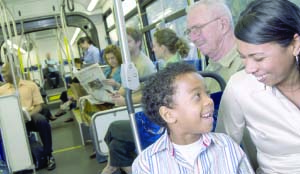 WITH the growing road traffic accidents that have led to loss of many lives in our country, there is need for measures that will have lasting effects on maintaining or improving on road transport safety.
WITH the growing road traffic accidents that have led to loss of many lives in our country, there is need for measures that will have lasting effects on maintaining or improving on road transport safety.
For some time now, even with strong prayers, it is difficult to predict one arriving at one’s destination safely, especially on long distance routes. The driving and the attitude of many passenger bus service drivers are reckless and bad, respectively.
Each time one reaches one’s destination safely, one thanks God for His mercy to allow that person arrive safely.
To achieve high road transport safety, among others, there is need to orient public passenger bus services’ crews on effective public relations (PR) matters.
Road transport passenger bus services have all sorts of unbecoming behaviour and attitudes, including reckless driving that all lead to road traffic accidents and loss of lives on our roads.
Get on a minibus or on big passenger bus on routes to Chirundu, Monze, Mumbwa or to Chipata, Livingstone, Solwezi, Nakonde, etc; you will thank God for reaching your destination safely. The speeding is bad and catastrophic to human life.
Some passengers have tried to remind bus drivers and their conductors of the importance of good conduct towards passengers and careful driving, but all in vain.
Traffic police and Road Transport and Safety Agency (RTSA) officers have tried to discipline and fine respective drivers and owners of such buses, including taking drivers into custody in police cells over the weekend, but this hasn’t achieved the desired results.
As a result it is reported that Zambia is one of the countries in the Southern African Development Community (SADC) with the highest number of road traffic accidents.
Surely, why should abnormal and offensive conduct that leads to loss of many lives be accepted as normal in our society?
Some people have accused the traffic police of being corrupt in enforcing road traffic rules.
Some members of the public have wondered why one bus is impounded thrice or six times for various offences in a day, but still the same bus is offering passenger services on that day using the same route.
One also wonders the conditions of many passenger buses both in rural and urban areas. Are most of these passenger buses roadworthy?
Do they qualify to carry human beings considering their condition, quality of seats and other factors suitable for carrying people?
What do traffic police and RTSA officers look for in order for such passenger buses to be transporting passengers?
This question begs immediate answers because the same RTSA has told the nation that 90 per cent of the road traffic accidents are caused by human error.
 Upon seeing how well a certain minibus driver was driving the vehicle with passengers, this writer asked the driver whether he was the owner of that minibus or not.
Upon seeing how well a certain minibus driver was driving the vehicle with passengers, this writer asked the driver whether he was the owner of that minibus or not.
The driver said he was the owner of the minibus he was driving.
When he was told that most minibus drivers were reckless on the road while carrying passengers, and wondered whether such drivers were given any orientation on traffic rules and effective PR before they were given a minibus to drive, this minibus owner, who was also driving the same bus, told this writer that the challenge most minibus owners faced nowadays was that there were too many minibuses for too few trained drivers to employ.
As a result, this minibus operator said what minibus owners did was that as soon as did they bought a minibus they looked for anyone to drive for that minibus to start bringing in revenue to recover the cost of buying that vehicle.
He said most minibus owners didn’t ask for driving licences from people who wanted a mini-bus driving job because their interest was to start recovering the cost of buying a minibus.
Therefore, most of the so-called minibus drivers we see on certain routs like Lusaka’s Chawama, Kanyama, Garden House, etc and also in many other towns are neither trained in driving nor oriented in PR.
Another minibus owner said the same, and added that out of all minibus drivers at Lusaka’s City Market bus station, less than 10 were trained drivers.
The rest are not but drive minibuses carrying passengers.
But this situation is not confined to minibus public transport alone. Even big buses on long routes, passengers face a lot of bad behaviour from bus crews.
Overloading and speeding are common road traffic offences passengers, traffic police and RTSA notice on many buses. When passengers make such observations, some drivers who are in most cases under the influence of alcohol respond:
“Don’t worry. Naine nili na bana monga imwe” meaning that there is no need to worry because he (driver) is driving carefully since he also cares for his children.
“And when one insists on advising such a driver to drive passengers with care, he rudely shows you the so-called public service vehicle (PSV) licence and says: “I am a qualified PSV driver. What can you tell me?”
Because of ignorance, some passengers also support such bus drivers to drive the way they want.
Some passengers argue that it is not good to speak to the driver while he is driving. They add that the driver should do what he wants because he knows what he is doing.
The passengers make such statements without considering that it is the same attitude and way of driving that causes road traffic accidents in our country.
Many bus drivers both on short and long-distance routes like taking some drinks in soft drinks’ bottles while in real sense what is inside is not a soft drink but ‘hard drink’ like ‘tujili jili’-related hard stuff.
Such a situation has brought chaos in public bus service transport to such an extent that hardly a week passes without learning of a fatal road traffic accident.
But when this writer wanted to find out from one of the RTSA officers in Lusaka’s Freedom Way why Zambia has one of the highest numbers of road traffic accidents in the SADC region, this young RTSA officer jokingly said: “Don’t worry. We are better-off ourselves in Zambia.
Some countries like South Africa have higher road traffic accidents than Zambia.”
This writer was astonished to hear this from a RTSA officer. I asked myself: ‘Why does RTSA spend a lot of money patrolling roads and producing information and public materials on road transport safety if there is no need to worry about these road traffic accidents?’
While few accidents are reported in minibus short routes, there are a lot of challenges passengers face within these short routes because minibus drivers are either not qualified to drive such vehicles or they are too rude for passengers who make such observations on careless and risky driving.
If Zambians travelling on public transport had an alternative, buses in Zambia were going to be avoided at all costs because they are a big risk to human life.
This doesn’t mean that no good passenger public transport exists. They are there.
But passenger buses with safe driving and effective PR are too few to talk about compared to the many passenger public transport services that are a risk to life.
This is why we have road carnage almost every week in many parts of this country.
And one wonders why passenger trains on both short and long-distance routes such as the former commuter train from Matero to Chilenje and that from Northern or Copperbelt to Southern Province are still a pipe dream in this country as such would have rescued most Zambians from such havoc, risks and deaths.
From the high rate of road traffic accidents, some people have been blaming RTSA and traffic police for not doing enough even when such Government institutions are doing the best they can to prevent accidents.
One of the traffic police officers said: “In fact, the public should thank us for reducing road traffic accidents because by us merely being on the road or patrolling the roads, some road traffic accidents which would have happened are avoided.”
Surely, unless most passenger bus services improve on their road safety and effective PR, the coming of alternative means of public transport will make them go out of business.
(The author is a PR Trainer and Consultant. For comments and ideas, contact: Cell: 0967/0977 450151; E-mail:sycoraxtndhlovu@yahoo.co.uk)






